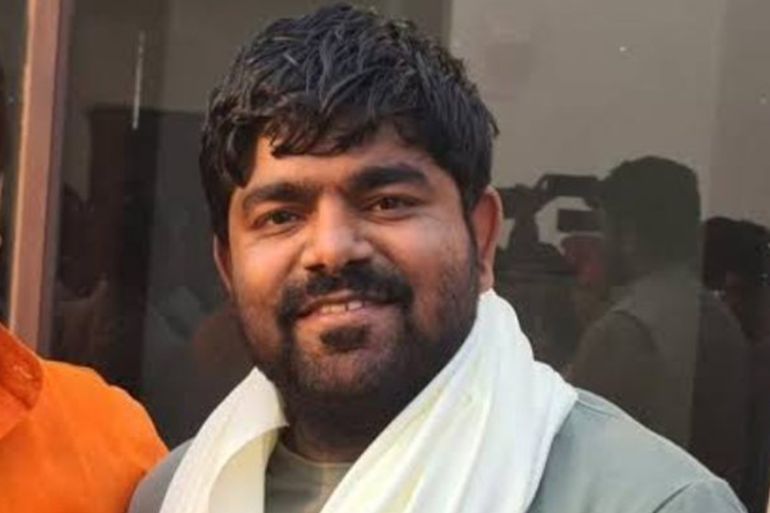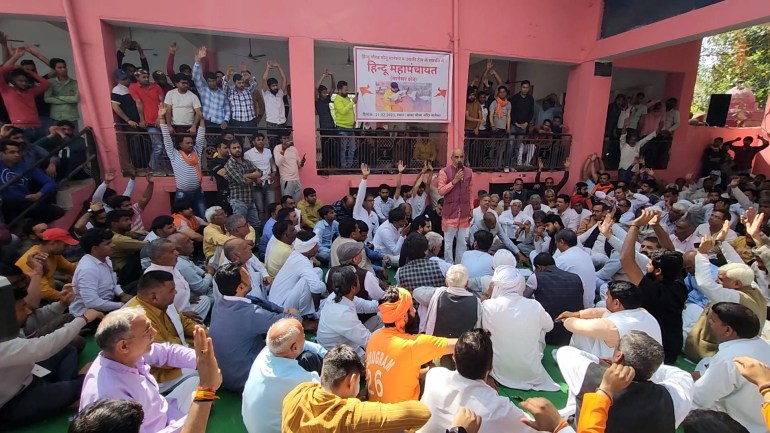Who is Monu Manesar, Indian vigilante accused of inciting Haryana violence?
A video released by Manesar two days before the deadly communal riots in Nuh is believed to be the trigger, but he is yet to be arrested.

Nuh, India – In February this year, two Muslim men were abducted and allegedly burned alive in their car by a group of cow vigilantes in India’s northern state of Haryana.
As the charred skeletons of the two men – Nasir Hussain, 28, and Junaid Khan, 35 – were discovered inside an SUV in the state’s Bhiwani district, the main accused, 28-year-old Mohit Yadav, became a poster boy of cow vigilantism in India and a subject of extensive public scrutiny.
Keep reading
list of 4 itemsMuslim homes, shops bulldozed; over 150 arrested in Nuh in India’s Haryana
India court asks if Nuh demolitions were ‘an exercise of ethnic cleansing’
Hindu mob kills imam, sets fire to mosque in India’s Gurugram
Haryana is governed by Prime Minister Narendra Modi’s Bharatiya Janata Party (BJP), which has been accused of patronising Yadav, better known as Monu Manesar, and preventing his arrest in numerous such cases of cow-related attacks and even killings.
Many Hindus belonging to the privileged castes consider cows sacred. The sale and consumption of beef are banned in several Indian states, mostly in the north.
Dozens of Muslims have been lynched on suspicion of killing or transporting cows since 2014 in attacks critics say were enabled by the rise of Hindu nationalist Prime Minister Narendra Modi to power.
How is Manesar linked to Nuh violence?
In Nuh, Haryana’s only Muslim-majority district, Manesar heads the local cow protection unit of the Bajrang Dal, the far-right youth wing of the Vishwa Hindu Parishad (World Hindu Council or VHP), which in turn is affiliated with the Rashtriya Swayamsevak Sangh (RSS), the BJP’s ideological mentor.
Founded in 1925, the RSS aims to create an ethnic Hindu state out of a constitutionally secular and religiously diverse India. The secretive organisation has millions of lifetime members across the world’s most populous nation and also abroad.
On July 31, the VHP and the Bajrang Dal decided to take out a religious procession through Nuh, with many participants carrying swords, tridents, sticks and firearms, and allegedly raising anti-Muslim slogans.
Two days before the procession, a Facebook video went viral, showing Manesar exhorting Hindus to congregate “in large numbers” for the procession in Nuh, saying he will also be there.
According to the police and the Hindu groups, the mostly Muslim residents of Nuh, angry over the February killings of Nasir and Junaid and other such incidents involving Manesar, attacked their procession with stones and burned some vehicles along the highway.
Nuh’s Muslims, in turn, accuse the Hindu groups of starting the violence, in which at least six people, including two Bajrang Dal members and two police guards, one of them Muslim, were killed.
Soon, the violence spread to the neighbouring Gurugram district where a mosque was attacked and its imam beaten and stabbed to death.
In response to the violence, more than 1,000 properties – mostly belonging to Muslims – were bulldozed by the Haryana government in Nuh, forcing an Indian court to ask if it was an “exercise of ethnic cleansing”.
Last week, several village councils in the region and a leading farmers’ group demanded Manesar’s immediate arrest to restore communal harmony and peace in the region, less than 100km (62 miles) from the national capital, New Delhi.
But he remains at large as anger over police inaction continues to simmer in Nuh and Gurugram.
What else is Manesar accused of?
Since his college days, Manesar, who holds a polytechnic diploma in engineering, has been a member of the Bajrang Dal, a group with a decades-old history of attacking minorities, mainly Muslims and Christians.
He was only 21 when a horrifying video, again from Haryana, showing him and his men attacking Muslims went viral in the summer of 2016. The video showed two Muslim men, their faces swollen and bloodied, being forced to eat cow dung after they were beaten for allegedly transporting beef.
Such videos are shared widely by right-wing Hindu groups on social media and WhatsApp groups to terrorise Muslims and other minorities. Soon, Manesar began to gain notoriety as a hardline vigilante.
His YouTube channel won a silver play button for having over 200,000 subscribers while his Facebook page boasted of more than 83,000 followers.
His posts mostly featured videos of high-speed chases and crashes, men flashing firearms and firing at trucks allegedly carrying beef, and photos and videos of injured men, usually Muslims, attacked by his team. Some photos showed him with powerful politicians and officers, including Home Minister Amit Shah.
Despite Meta and Google taking down his Facebook and YouTube pages respectively earlier this year, his videos are still shared widely by numerous fan pages run by right-wing groups and individuals.
Meanwhile, Manesar began to appear in debates on pro-BJP news channels, where he defended his violent cow vigilantism and attacks on Muslims.
In 2021, Manesar was invited to speak at a mahapanchayat, or a grand council of villages, called in support of some Hindu men accused of murdering a Muslim gym trainer, Asif Khan, who was also from Nuh.
At the mahapanchayat, Manesar was introduced as someone who shoots and gets shot at by “cow-smugglers”. In his speech, Manesar asked the crowd to prepare a list of Muslim men allegedly involved in “love jihad” – a far-right conspiracy theory that believes Muslim men target Hindu women through romance and marriage in order to convert them to Islam.
Manesar vowed his team would kill these Muslims.
What do Muslims in Haryana allege?
After the killings of Hussain and Khan in February, multiple victims came out in public with chilling testimonies and video evidence of torture posted online by the vigilante groups. The demands to arrest Manesar and his associates grew.
Imran Khan told Al Jazeera his cousin, Waris Khan, a motorcycle mechanic, was also allegedly lynched by Manesar’s gang a few weeks before Nasir and Junaid were murdered.
While police claimed Waris’ death was an accident, a video appeared showing him and two other men being forcibly shoved into a car. The man shooting the video asks the men to tell their names on camera.
Imran alleged the video was telecast live on Manesar’s Facebook page and showed Waris injured and bleeding, hours before he succumbed to his injuries at a government hospital in Nalhar.
He said the video has now been deleted and can be independently verified by the authorities.
In recent years, Nuh, also known as Mewat, has become an easy target for vigilante raids under the garb of cow protection, adding to anger and distrust among its residents.
“There was anger in the whole village when Monu Manesar was not arrested after Nasir and Junaid’s murder. If he was not given impunity by the government, he would not be roaming free. If he had not released his video before the July 31 procession in Nuh, riots would not have taken place,” Maksood Khan, a 22-year-old truck driver from neighbouring Rajasthan state, told Al Jazeera.

Nasir Hussain and Junaid Khan belonged to Maksood’s village in Rajasthan.
Nuh-based lawyer Tahir Hussain Devla alleged Manesar himself was a cow smuggler.
“He is the biggest cow smuggler in Mewat. He extorts money from trucks for letting them pass through his area,” he told Al Jazeera.
Residents in Nuh blame Manesar and Bittu Bajrangi, another cow vigilante, for the recent violence.
Chaudhary Aftab Ahmad, the member of the legislative assembly from Nuh, accused the authorities of not acting despite his warning of possible violence in his constituency.
“There was definitely an apprehension of violence before the procession. It was building up through videos of Monu Manesar and Bittu Bajrangi on social media. I had flagged this to the SP [superintendent of police] of Nuh a day before through telephone that the situation may get out of control. They assured me that they are aware of all the things,” he told Al Jazeera.
How have the governments responded?
Raman Malik, the BJP spokesman in Haryana, rejected the demand for Manesar’s arrest. “Why should Monu Manesar be arrested?” he told Al Jazeera.
When he was reminded of Haryana chief minister Manohar Lal Khattar’s statement on August 2 calling Manesar a criminal and vowing to help the Rajasthan police in nabbing him, Malik replied: “Then the Rajasthan police should do it. Why should we do something that is not our responsibility?”
Malik said Manesar is already cooperating with the police investigation and so there is no need to arrest him. “If there is a threat of him fleeing or not cooperating with the police, then they will act accordingly,” he said.
In June, Manesar told The Indian Express newspaper he was not absconding. “I haven’t got a notice from any police, Rajasthan or Haryana. If they call me for questioning, I will cooperate,” he said.
Meanwhile, the Haryana and Rajasthan governments are involved in a blame game over acting against him. In a news conference on August 2, Khattar said: “Since the Rajasthan police is searching for him, we don’t have the inputs on his whereabouts. Rajasthan police is free to act against him.”
The next day, his Rajasthan counterpart Ashok Gehlot posted on X, the platform formerly known as Twitter, alleging that when Rajasthan police went to arrest Manesar, the Haryana police did not cooperate and instead registered a report against some Rajasthan police officers.